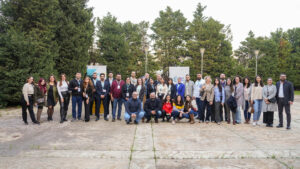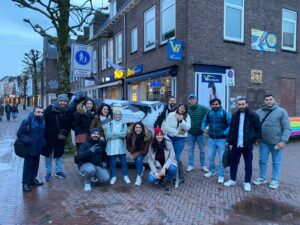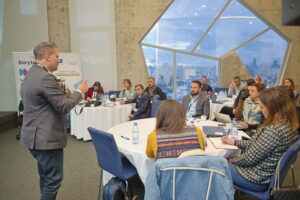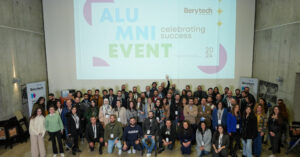
The Food System Challenge (FSC) team is keen on going the extra mile in creating meaningful synergies between the program’s beneficiaries and the ecosystem’s stakeholders.
The purpose of these synergies is beyond attempting to link between entities and people, but rather creating meaningful opportunities at different levels. The core value of Berytech remains in its ability to successfully connect, orient, and advise in the proper direction to establish fruitful synergies and provide value.
Fawzi Khalil, FSC Business Advisor, further explains how Berytech helps its ecosystem grow and succeed collectively: “Success belongs to those who know how to catch opportunities, work smartly, and importantly, capitalize on available resources to be able to expand horizons. And here comes our essential role as Business Advisors; we are the guiding hand for each company we work with through our programs. We incorporate the culture of synergies and collectivity throughout all our interventions; one company’s win can also be yours if leveraged smartly. During our dire economic crisis, working synergically is pivotal to sustain operations.”
The Rippling Effect of Created Impact
It all started when, Kobbayat Cooperative, a beneficiary of the first cycle of the program, wanted to import a hydroponic fodder system from Turkey. Smart Land, Berytech’s Clean energy alumnus, has been working on the fodder hydroponic system and is currently selling its system and services to farmers.
The two were connected and a fruitful collaboration was established between the two companies. The synergy has been translated into a profitable exchange and long-lasting relationship between Kobbayat Cooperative and Smart Land.
From one side, the startup was able to successfully deploy its hydroponic system, gain more exposure, better its positioning in the market, and expand its visibility. On the other side, the cooperative was able to secure a system made locally and hence guarantee more convenient after-sales and maintenance services, save from the budget allocated for capital expenditure, inject hard currency into the local economy, and revitalize the economic exchange. There is a rippling effect when the intended impact created is channeled in the right direction.
Linkages Towards Circular Economy
The synergy that was created between Agrifresh, and Dooda Vermicompost Solution exemplified the true meaning of a circular economy.
Agrifresh, a company producing fresh-cut vegetables and dehydrated products, is providing the plant’s organic waste to Dooda, also an Agrytech alumnus. By this, Dooda will be securing consistent organic feed for her vermis and Agrifresh will be effectively discharging its waste.
Through this collaboration, costs for Dooda will be reduced by 15%. “We sincerely appreciate this collaboration, which we owe in large part to our Business Advisor, who helped us connect the dots. Dooda’s facility will soon relocate to the Beqaa, where we will be closest to our suppliers and customers. Also deserving of praise is Fawzi, who was eager to help us with this through his network,” Dooda Solution’s owner, Nada Ghanem, said.
A Point Scored for Contract Farming
Ten farmers have been contracted so far by Rim Mills to deliver their seasonal wheat produce to the factory which processes the wheat into Moghrabieh and Bulgur. Farmers in the Beqaa area are contracted to sell the produce at an average rate of $450/ ton as the company confirmed, guaranteeing a sustainable and consistent income for farmers.
Contract farming is indubitably an instrumental tool to promote and enhance the agriculture sector in Lebanon, it is also a protective shield for farmers in the most vulnerable areas. With a very poor to the almost non-existent current legal framework and lack of proper awareness in these realms, contract farming remains a practice that needs to be highlighted, promoted, but importantly, framed, and incentivized.
In that same scope, Natagri, a Lebanese company located in Zahle, will be contracting farmers to provide them with the third-grade grape to produce raisins at a rate of $0.7/kg instead of $0.3/kg, i.e., the company will be contributing to increasing the farmer’s revenues on that specific produce by 133%, offering more than double the price. This is a model agreement that represents fair contract farming.
The Food System Challenge
The Food System Challenge is implemented by the World Food Programme (WFP) and Berytech through support from the German Federal Ministry of Economic Cooperation and Development (BMZ).
The program’s main outcomes are enhanced food security, a well-functioning local food system, enhanced efficiency and resilience of cooperatives and SMEs working across different streams of the food systems, and to increased employment opportunities especially for women and vulnerable individuals.
About The Author
Samar Yammine is a Program Officer for the Food System Challenge (FSC) at Berytech. She holds a bachelor’s degree in Chemical Engineering and is pursuing her studies in Resource Management. A passionate researcher in the subjects of water, wastewater, and energy management, Samar’s interests expand to processing, innovation, digital marketing, entrepreneurship, and artificial intelligence.







